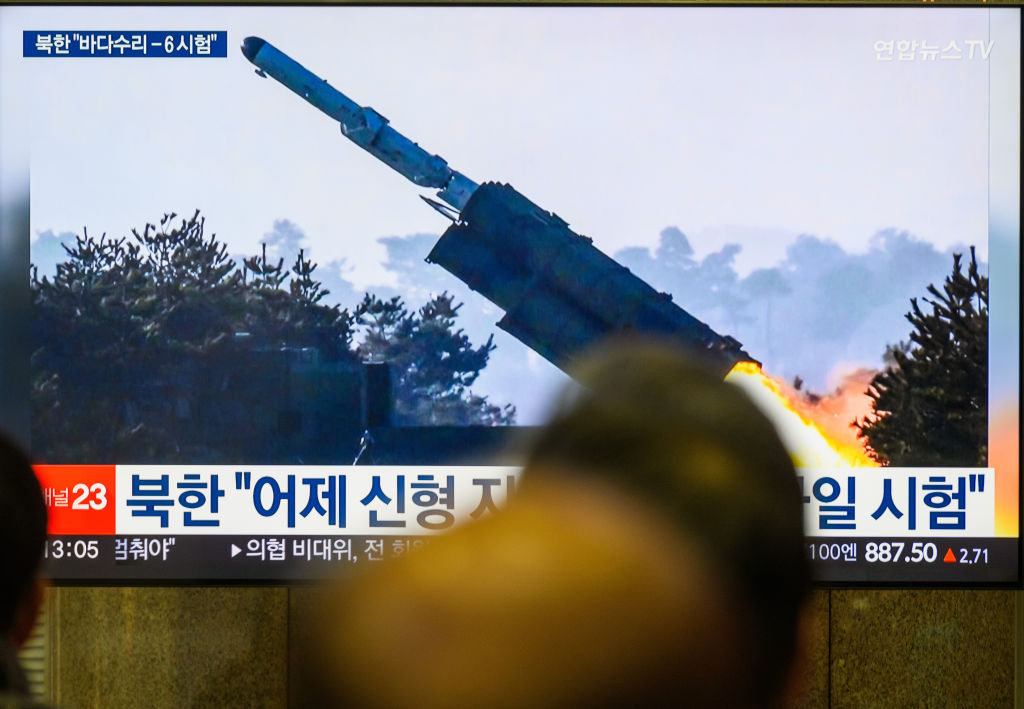
Over the decades, North Korea’s leaders have periodically made bombastic threats of military force against South Korea and its foreign backers, particularly the U.S. and Japan. And for the most part, while carefully monitoring North Korean military moves on the ground, by sea, and in the air, leaders in Seoul, Washington, and Tokyo could dismiss these incendiary-sounding warnings as a substitute for action rather than a sign that aggression is imminent.
There are reasons why that might be changing—and why we should now pay closer attention to what Kim Jong Un and his generals are up to. There are growing worries North Korea could carry out a surprise attack or launch some other provocation against South Korea over the course of this year, even if it falls short of war. The risk looks particularly high in the run-up to South Korea’s next legislative elections, now set for April.
First, it is worth noting that North Korea’s Kim has publicly stepped away from previous claims that Pyongyang’s ultimate goal is a peaceful reunification of the two Koreas on North Korea’s terms, a fantasy North Korean officials have promoted for decades. To be sure that his point wasn’t too subtle, he recently ordered the destruction of a large monument to reunification in Pyongyang and tagged South Korea as his country’s “primary foe and invariable principal enemy.”
This comes at a time when North Korea is also partnering more closely with Moscow in the supply of weapons and ammunition for Russia’s war on Ukraine, partially in exchange for Russian technology that could boost North Korea’s long-range firepower, satellite coverage, and cybercapabilities, including against American targets. The longtime ideological affinity Moscow and Pyongyang share in hopes of building a world order no longer dominated by U.S. power has increasingly shifted into commercial relations with battlefield importance, boosting Pyongyang’s self-confidence and maybe its risk tolerance.
Read More: U.S. Hawks Must Get Real About China
Second, I’m hearing more overt warnings from senior Chinese officials, unhappy with closer North Korean–Russian relations, of a potentially “explosive” threat that North Korea poses for South Korea. For his part, South Korea’s President Yoon Suk-yeol is offering no conciliation in response. In fact, he has pledged that his country would hit back “multiple times as hard” against any North Korean assault.
North Korea has become more aggressive in the past month. In the first week of January, its forces fired artillery shells into a buffer zone near the maritime border that separates North and South Korea. Seoul fired back, though no casualties were reported. On Jan. 14, North Korea test-fired a solid-fuel intermediate-range ballistic missile. On Jan. 19, it claimed to have tested a nuclear-capable underwater attack drone, though South Korean officials called this claim exaggerated. On Jan. 24 and 28, North Korea test-fired submarine-launched strategic cruise missiles. On Jan. 30, it test-fired a land-based strategic cruise missile. Even by Pyongyang’s standards, that’s a lot of noise in a single month.
The basic facts that have prevented war for the past 70 years haven’t changed enough for anyone to expect an open cross-border conflict. Beijing still has crucial influence within Pyongyang’s political and military leadership, and China’s Xi Jinping has taken notice of North Korea’s new tone. There is also still an understanding on both sides of the DMZ that given the weapons in both countries’ arsenals, an all-out war would quickly kill tens of millions of people, and North Korea’s government would cease to exist.
But that’s not enough to prevent provocative border incursions, drone infiltrations of opposing airspace, cyberattacks, and other actions that raise the risk of accidental confrontation that both sides might find hard to contain. The Biden Administration is now focused on turmoil in Gaza, on Ukraine’s battlefield, and at the U.S. southern border. That shouldn’t take anyone’s focus off North Korea’s newly belligerent behavior.
More Must-Reads from TIME
- Breaking Down the 2024 Election Calendar
- How Nayib Bukele’s ‘Iron Fist’ Has Transformed El Salvador
- What if Ultra-Processed Foods Aren’t as Bad as You Think?
- How Ukraine Beat Russia in the Battle of the Black Sea
- Long COVID Looks Different in Kids
- How Project 2025 Would Jeopardize Americans’ Health
- What a $129 Frying Pan Says About America’s Eating Habits
- The 32 Most Anticipated Books of Fall 2024
Contact us at letters@time.com